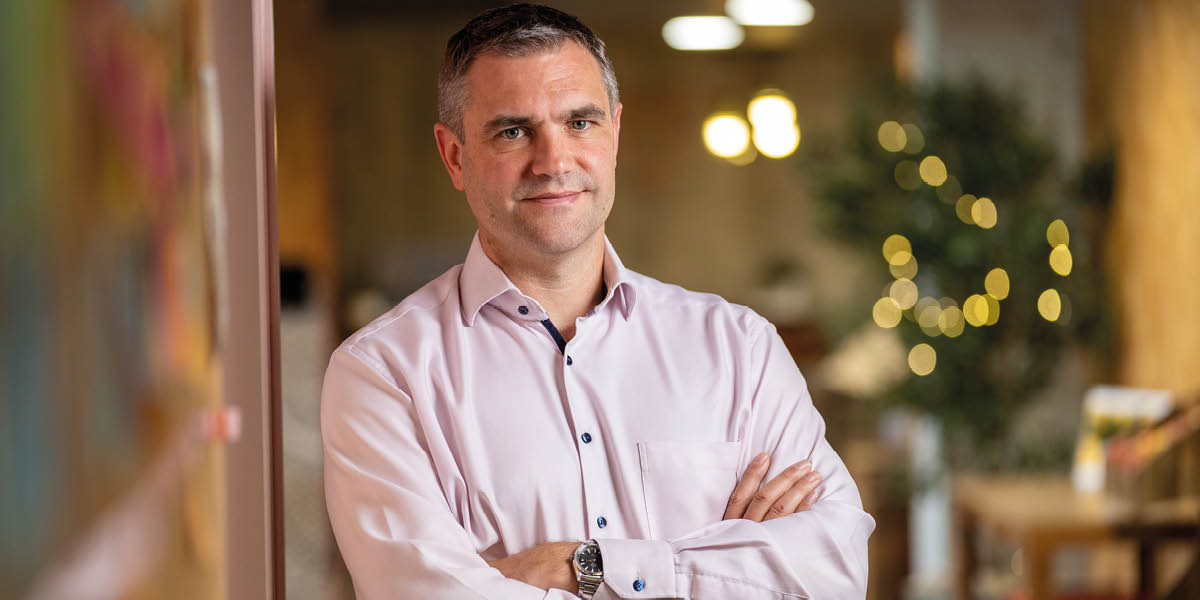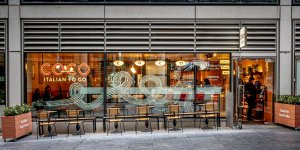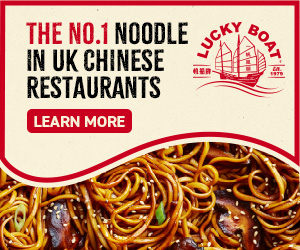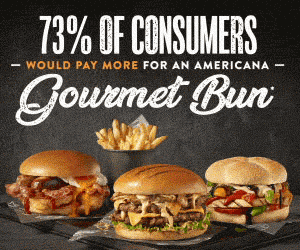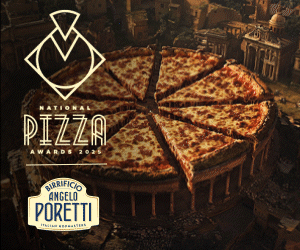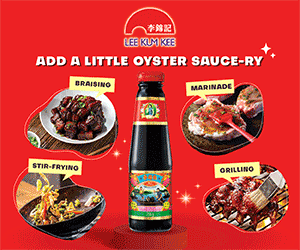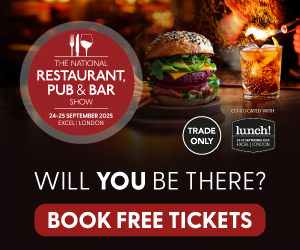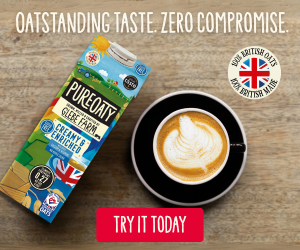Feature: Hospitality for people and planet

Dine Out editor Genna Ash-Brown sits down with Steve Holmes, CEO of Azzurri, to discuss the group’s unwavering dedication to sustainable operations
As the owner and operator of some of the UK’s most recognisable casual dining brands, the Azzurri Group’s activities always seem to generate a buzz. With concepts including Zizzi, ASK Italian and Coco di Mama forming a growing estate of over 230 restaurants and stores nationwide, Azzurri’s concepts are certified household names for consumers across the UK. While many would consider its flagship brands to be both comforting and familiar, the group is always on a mission to adapt and evolve.
In 2023, for example, the company tightened its grip on the quick service restaurant segment, also branching out into Mexican cuisine with the acquisition of fast-food chain Boojum.
“On the outside, people think that we’re an Italian restaurant business, but that was actually more by luck than design,” Azzurri CEO Steve Holmes explains. “The vision for Azzurri when we created the business 10 years ago was always to be a hospitality investment platform, whereby we have some expert central services – so that’s procurement, property, accounting, digital technology, ESG (environmental, social and governance), etc – and then a group of businesses that can sit underneath that central group and are able to run independently with their own management teams. The idea was that they would grow faster, drawing on the expertise of the group so they could be more successful than they would necessarily be on their own. It just happened to be that we had ASK and Zizzi, and then we acquired Coco – pure coincidence that they’re all Italian. But as food-to-go, Coco is a different model entirely and we liked the diversification.”
And that’s exactly why the group got excited about Boojum. As a fast-casual business with a different demographic than the likes of ASK and Zizzi, catering to students and younger people rather than families and group dining, the acquisition adds another arm to Azzurri’s expanding catalogue. “And obviously, Boojum is an entirely different cuisine,” adds Holmes. “We liked the fit because it was different and we thought we could help the brand branch out from Ireland to Great Britain.”
There will always be interest around the developments within a business as large and influential as Azzurri. The recent opening (10 April) of the first mainland Britain branch of Boojum in Leeds is testament to this, with punters queuing up for hours around the block to bag their first burrito. Holmes and his team are constantly looking out for new and exciting ideas to build the brand portfolio, which is generally the case with companies of this scale. And while the group’s business track record is commendable, its commitment to positively impacting people and planet is even more impressive.
Conquering carbon
Azzurri published its third annual Sustainable Dining Report in March, sharing the progress the business has made in the last financial year. In this most recent instalment, the group revealed that it has managed to cut its greenhouse gas (GHG) emissions by almost 10% – an incredible feat considering it has been simultaneously expanding its estate. “We’ve grown in size, served more customers and opened more restaurants, yet we’re treading more lightly on the planet than ever before from an emissions perspective,” Holmes observes.
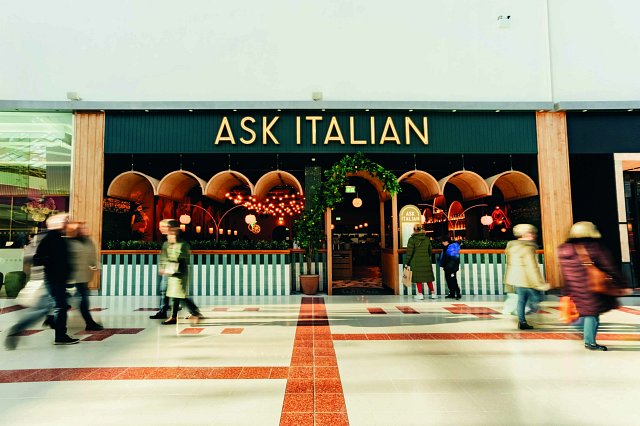
ASK Italian, Merry Hill
Much of the group’s progress comes from its Scope 3 emissions – notoriously known as the most difficult to reduce. Unlike Scopes 1 and 2 (with the former covering emissions from sources the organisation owns or controls directly, and the latter covering those that the company causes indirectly, through the energy it uses, for example), Scope 3 encompasses emissions that are not produced by the company itself but derive from its supply chain.
“Tackling Scope 3 has been our biggest sustainability challenge so far because it’s not in our direct control,” he explains. “The process for reducing Scope 1 and 2 can be complicated, but it’s easier because both are within our control. Dealing with Scope 3 is also more expensive. It’s a tricky thing to manage – you want to balance the quality of your proposition and not compromise the business, but you’ve also got to weigh up these complex financial elements. Scope 1 and 2 are relatively easy because 80–90% comes down to using renewable energy anyway. Scope 3 is much harder but, ironically, that also makes it the biggest opportunity.”
There are many cogs to Azzurri’s flourishing network of environmentally focused initiatives. Takeaway packaging across both Zizzi and ASK is now 100% recyclable, for example. The use of paper-based pasta bowls has cut 48 tonnes of plastic from the company’s supply chain, while redesigned pizza boxes have eliminated over 145,000m² of cardboard – equivalent to 16 football pitches – every year.
“There are lots of things you can do that just require the right mindset,” says Holmes. “You can still get good-quality packaging with fantastic branding that represents your brand, but that’s made from 100% recyclable materials. Yes, there’s an argument that it’s a bit more expensive but you have to weigh it off with something else. You can’t just consider the cost at face value, and you can’t ignore the opportunity either. We’re trying to get better at saying, ‘Well, we know this might cost us more money, but what can we do to balance it out?’ By doing that, we can take steps forward and hopefully make progress over the medium term.”
Many factors contribute to the restaurant industry’s GHG emissions, but the Intergovernmental Panel on Climate Change estimates that food waste accounts for a staggering 8–10% of environmentally harmful human-made fumes. Responding to the challenge, Azzurri’s Coco di Mama brand struck up a partnership with sharing app Olio, and has so far redistributed 10,000kg, the equivalent of almost 24,000 meals, to communities across the UK.
“There’s much less waste in ASK and Zizzi because the food is prepared in the restaurant,” notes Holmes. “Coco is a much smaller, food-to-go concept so, unfortunately, there’s a lot more good-quality food that gets ‘wasted’ – but we don’t just let it go in the bin. We donate it to various charities and people who need it.”
Working with Wildfarmed
But that’s not all; as of 12 March, all 66 branches of Azzurri’s ASK Italian switched to making pizza with regenerative dough, becoming the first major Italian high-street brand to make such a change. It comes through a partnership with Wildfarmed – a company centred on low-input farming that uses no pesticides, fungicides or herbicides, and places biodiversity at the heart of all activities.
“You don’t make progress unless you have buy-in from the majority of the organisation, and this is a great example of an idea that came from someone in our team,” says Holmes. “So, we worked with our guys in the restaurants but also in our supply chain function. They understood what we’re trying to do as a business and saw an opportunity to effectively establish this closed-loop system.”
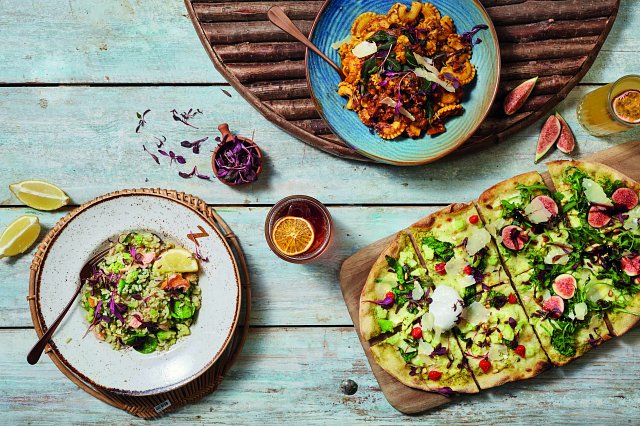
A Zizzi feast
In a nutshell, the collaboration means food waste from the restaurants is now turned into fertiliser. This is then shared with growers who put it on their wheat fields, which is then harvested by the milling company and turned into flour. This then goes back to the factory where ASK’s dough is made and shipped back out to the restaurants before landing in front of guests. It’s regenerative farming in action – it’s inspiring and incredible.
“It’s the initiative and tenacity of a few individuals who had the vision to be able to see that this was possible,” emphasises Holmes. “As an organisation, it was up to us to enable and empower them to put it into action. These things don’t just happen by chance – everyone has to be on board. And, before you know it, you’ve created the UK restaurant industry’s first closed-loop system.
“Customers want to buy from businesses that conduct themselves sustainably, but they have to be doing so genuinely – not just talking about what they’re going to do and never actually putting it into action,” he adds.
“You have to provide an experience, product and proposition that they’re willing to pay for, but you also have to do it responsibly. It can’t be one or the other – it has to be both.” Holmes and the team at Azzurri are making these bold, brave and leading-edge choices so that, ultimately, consumers don’t have to.
This is a group that puts its money where its mouth is, aiming for ambitious targets (or “big, hairy goals”, as Holmes likes to call them) that set the wheels for positive change in motion.
“At the end of the day, we all have a shared love of the planet, and most people want to leave it for future generations to enjoy,” he concludes. “I think we all have a responsibility and, as a bigger business, we arguably have an even greater responsibility as we can have a bigger impact than we would as individuals.
“We have a duty to be a better business and tread as lightly as we can on the planet, preferably at a net zero sort of level. But it’s going to take time to get there and many people need to go on a journey for it to happen. We started that journey many years ago and we’re delighted, since we’ve also been able to grow as a business. But there’s still lots more to do. I’d rather have a big, hairy goal that feels difficult and miss it by a year than spend three years trying to figure out a realistic goal and achieving nothing. At least setting the goal gives you the chance to go after it – that’s our mindset, that’s our culture. If we miss it, at least we can say that we tried.”


